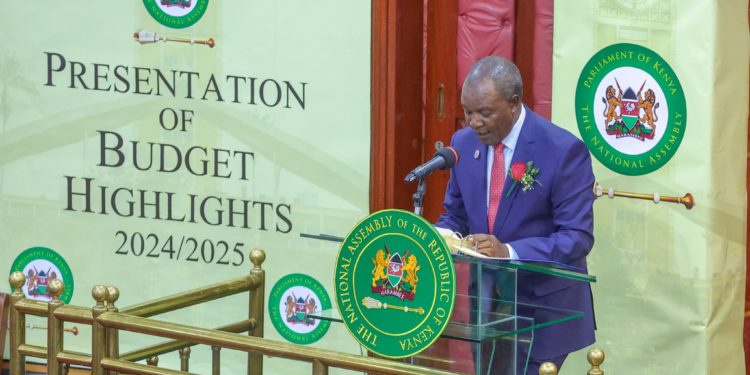Kenya’s Cabinet Secretary for the National Treasury, Njuguna Ndung’u, unveiled a KES 3.99 trillion budget for the 2024/25 fiscal year, designed to sustain the country’s bottom-up economic transformation, consolidate fiscal discipline, and invest in climate change mitigation.
Themed “Sustaining Bottom-Up Economic Transformation Agenda, Fiscal Consolidation and Investing in Climate Change Mitigation and Adaptation for Improved Livelihoods,” the budget reflects both ambitious growth plans and stringent fiscal measures, impacting various sectors differently.
Winners: Farmers, Manufacturers, and Affordable Housing
Agricultural Sector
The agricultural sector emerged as a significant beneficiary, receiving substantial allocations to support the Bottom-Up Economic Transformation Agenda (BETA). A total of KES 54.6bn has been allocated to various agricultural programs, with KES 10bn earmarked for the Fertilizer Subsidy Programme to enhance productivity and food security. Additional funding targets the revival of key cash crops, including KES 2bn for the Coffee Cherry Revolving Fund, KES 1.5bn for sugarcane farmers’ debt payments, and KES 120m for the Cotton Industry Revitalization Project. Furthermore, KES 1.5bn has been set aside for excess milk mop-up, and KES 500m for the modernization of Kenya Cooperative Creameries (KCC) milk factories.
Manufacturing Sector
The manufacturing sector received a boost with KES 23.7bn allocated for initiatives aimed at job creation and economic competitiveness. Key projects include the establishment of County Integrated Agro-Industrial Parks (KES 4.5bn) and the Supporting Access to Finance & Enterprise Recovery (SAFER) Project (KES 1.9bn). Favorable tariff arrangements secured during the East African Community (EAC) Pre-Budget consultations, such as duty remissions on raw materials and inputs, further enhance the sector’s competitiveness.
Affordable Housing
Affordable housing also received significant attention, with KES 92.1bn allocated to the Housing, Urban Development, and Public Works sector. This includes KES 32.5bn for Affordable Housing Units, KES 15bn for Social Housing Units, and KES 14.7bn for social and physical infrastructure. Additionally, KES 3bn has been allocated to the Kenya Mortgage Refinance Company to support on-lending to primary mortgage lenders, enhancing access to affordable housing finance.
Losers: Betting Industry, Alcohol Makers, and Digital Service Providers
Betting Industry
The betting industry faces increased excise duty rates, rising from 12.5% to 20%, in a bid to curb social ills and expand the tax base. “Participation in betting, gaming, prize competition and lotteries continues to affect the socio-economic fabric of our society given their addictive nature,” stated Ndung’u.
Alcohol Industry
The alcohol industry will encounter a restructured excise duty, shifting from specific rates per liter to a rate based on alcoholic content. New rates are set at KES 22.50 per centiliter for wines and beer, and KES 16 per centiliter for spirits, aiming to encourage responsible consumption and reduce market distortions.
Digital Service Providers
In response to the challenges posed by the digital economy, the government plans to replace the Digital Service Tax with the Significant Economic Presence Tax. This move is intended to align with international best practices and ensure fair taxation for digital services, addressing the limitations of the previous tax design.
Fiscal Consolidation and Debt Management
Amidst these spending initiatives, the government remains committed to fiscal consolidation, targeting a reduction in the budget deficit from 5.7% of GDP in the current financial year to 3.3% in 2024/25. This will be achieved through a combination of tax policy and administration reforms, including the implementation of the Medium-Term Revenue Strategy (MTRS) to expand the tax base to 20% of GDP over the medium term. Expenditure measures include rationalizing transfers to semi-autonomous government agencies (SAGAs) by at least 30%, reducing non-essential spending, and suspending new government recruitment for one year.
Climate Change Mitigation and Adaptation
In recognition of the severe impacts of climate change, the budget allocates resources for climate adaptation and mitigation strategies. Specific allocations include KES 5.9bn for the Kenya Financing Locally Led Climate Action Project, KES 10.7bn for Forest Resources Conservation and Management, and KES 13.1bn for wildlife security, conservation, and management. These measures underscore the government’s commitment to environmental conservation, reforestation, and wetland restoration.
Tax Hikes and Austerity Measures
The budget proposes a series of tax hikes and austerity measures that could impact taxpayers, manufacturers, importers, and public sector workers. Notably, an annual motor vehicle tax at 2.5% of the vehicle’s value, subject to a minimum of KES 5,000 per annum, is proposed. Additionally, the government plans to rationalize VAT tax expenditures, potentially increasing costs for manufacturers and consumers. Importers may face an Export and Investment Promotion Levy on certain imported goods, while some manufacturers will lose VAT exemptions, increasing their costs.
Public sector employees face uncertainty due to measures aimed at containing the growth of the public sector wage bill, including a wage freeze and limits on new hiring. All MDAs and County Governments are expected to review and rationalize their staff establishments to ensure affordability and fiscal sustainability.












